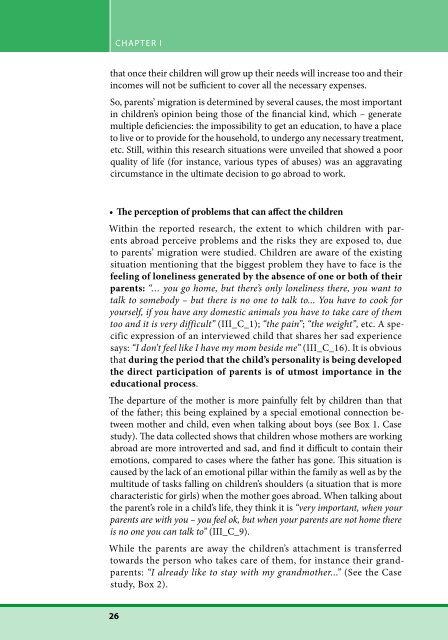specific needs of children and elderly left behind as a ... - IOM Moldova
specific needs of children and elderly left behind as a ... - IOM Moldova
specific needs of children and elderly left behind as a ... - IOM Moldova
You also want an ePaper? Increase the reach of your titles
YUMPU automatically turns print PDFs into web optimized ePapers that Google loves.
CHAPTER I<br />
that once their <strong>children</strong> will grow up their <strong>needs</strong> will incre<strong>as</strong>e too <strong>and</strong> their<br />
incomes will not be sufficient to cover all the necessary expenses.<br />
So, parents’ migration is determined by several causes, the most important<br />
in <strong>children</strong>’s opinion being those <strong>of</strong> the financial kind, which – generate<br />
multiple deficiencies: the impossibility to get an education, to have a place<br />
to live or to provide for the household, to undergo any necessary treatment,<br />
etc. Still, within this research situations were unveiled that showed a poor<br />
quality <strong>of</strong> life (for instance, various types <strong>of</strong> abuses) w<strong>as</strong> an aggravating<br />
circumstance in the ultimate decision to go abroad to work.<br />
• The perception <strong>of</strong> problems that can affect the <strong>children</strong><br />
Within the reported research, the extent to which <strong>children</strong> with parents<br />
abroad perceive problems <strong>and</strong> the risks they are exposed to, due<br />
to parents’ migration were studied. Children are aware <strong>of</strong> the existing<br />
situation mentioning that the biggest problem they have to face is the<br />
feeling <strong>of</strong> loneliness generated by the absence <strong>of</strong> one or both <strong>of</strong> their<br />
parents: “… you go home, but there’s only loneliness there, you want to<br />
talk to somebody – but there is no one to talk to... You have to cook for<br />
yourself, if you have any domestic animals you have to take care <strong>of</strong> them<br />
too <strong>and</strong> it is very difficult” (III_C_1); “the pain”; “the weight”, etc. A <strong>specific</strong><br />
expression <strong>of</strong> an interviewed child that shares her sad experience<br />
says: “I don’t feel like I have my mom beside me” (III_C_16). It is obvious<br />
that during the period that the child’s personality is being developed<br />
the direct participation <strong>of</strong> parents is <strong>of</strong> utmost importance in the<br />
educational process.<br />
The departure <strong>of</strong> the mother is more painfully felt by <strong>children</strong> than that<br />
<strong>of</strong> the father; this being explained by a special emotional connection between<br />
mother <strong>and</strong> child, even when talking about boys (see Box 1. C<strong>as</strong>e<br />
study). The data collected shows that <strong>children</strong> whose mothers are working<br />
abroad are more introverted <strong>and</strong> sad, <strong>and</strong> find it difficult to contain their<br />
emotions, compared to c<strong>as</strong>es where the father h<strong>as</strong> gone. This situation is<br />
caused by the lack <strong>of</strong> an emotional pillar within the family <strong>as</strong> well <strong>as</strong> by the<br />
multitude <strong>of</strong> t<strong>as</strong>ks falling on <strong>children</strong>’s shoulders (a situation that is more<br />
characteristic for girls) when the mother goes abroad. When talking about<br />
the parent’s role in a child’s life, they think it is “very important, when your<br />
parents are with you – you feel ok, but when your parents are not home there<br />
is no one you can talk to” (III_C_9).<br />
While the parents are away the <strong>children</strong>’s attachment is transferred<br />
towards the person who takes care <strong>of</strong> them, for instance their gr<strong>and</strong>parents:<br />
“I already like to stay with my gr<strong>and</strong>mother...” (See the C<strong>as</strong>e<br />
study, Box 2).<br />
26

















